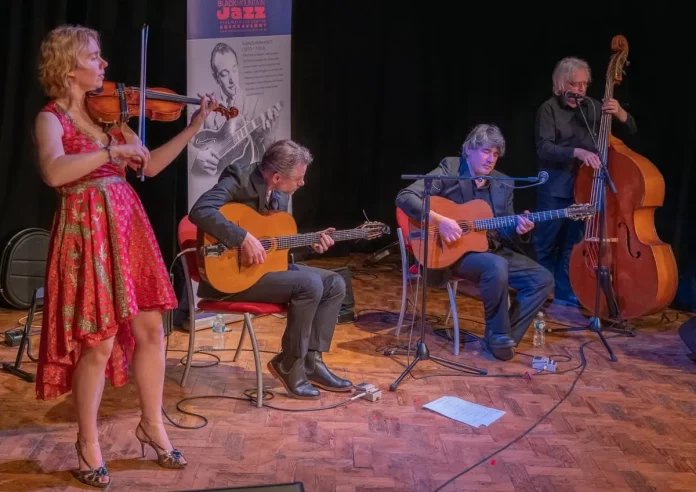
All-string jazz chamber groups based on the Reinhardt-Grappelli model have more options than their eccentric forebear had. Le Quintette du Hot Club de France might even be seen as an elegant clash of personalities – violinist Grappelli and guitarist Reinhardt – whipped onwards and upwards by a choo-choo rhythm section. Reinhardt pompously drew attention to this in noting that when Grappelli was taking a solo the rhythm section was augmented by a supercharged guitarist – himself – but a Reinhardt solo was backed by just two guitars which did little but chug and a violin that just embroidered. In both cases, of course, there was a bass doing groundwork.
Mike Morgan, bassist with the Welsh quartet Hot Club Gallois, also got to sing at its gig for Black Mountain Jazz in Abergavenny – on Nature Boy, There Will Never Be Another You and, perfunctorily, on Lady Be Good – and play electric bass on Chick Corea’s Spain. The Corea chart begins with the adagio theme from Rodrigo’s Concierto de Aranjuez, a gift for guitarist Richard Jones, who wore his natural propensity for all-tempo fluency and his background in academia lightly, and for guitarist Luke Archard, formerly a classical player and always keen to be in the thick of things. Jones also composes QHCF-type charts, including two played here: Bellevue Waltz, celebrating his Pontypridd domicile, and Café 39, inspired by a honeymoon in Paris. Despite a cold, Jones was bursting with “Ponty” quips, arguably the most droll in the valleys.
Violinist Xenia Porteous, standing at the opposite end of the line to Morgan with the seated guitarists in between, presided with boundless flair and assurance over what in musical terms at least was democracy in action, something that never detained Reinhardt and Co. There was no sense in which she wished to engage in gladiatorial combat with one or other of the guitars, because HCG tossed its musical material back and forth and ensured everyone was part of the permutations and never outstayed a welcome. On the frantic Reinhardt number Flèche d’Or, her single-note unison duetting was with Archard and in the Ponty waltz with its composer. Archard led the charge in Swing Gitan, Jones in For Sephora. Jones’s vocal on Honeysuckle Rose segued into an episode in which the two guitars were in unison-rhythm mode behind the violin.
QHCF originals, Reinhardt-inspired originals, and standards that Reinhardt and Grappelli played and recorded, all combined to guarantee a firing of the QHCF canon, as it were; but with a willingness everywhere to expand its formula. This extended to Bossa Dorado, in which Porteous abandoned the violin to dance tango-style with a member of the audience – three were already on their feet – and with a reminder for those in the know that the chart as performed by the Dutchman Stochelo Rosenberg’s trio has lyrics that might one day interest Morgan.
HCG is that sort of band – everything ventured, everything gained, and maybe lots more in the offing. It shares its onstage fun and banter with the audience, thus convincing the latter that it’s witnessing spontaneity and serious music-making at the same time. Not least of the band’s achievements was to sell every ticket for its gig at BMJ’s Melville Centre. Archivists are poring over documents to establish if it was some kind of record.
Hot Club Gallois at Black Mountain Jazz, Melville Centre for the Arts, Abergavenny, 26 March 2023















